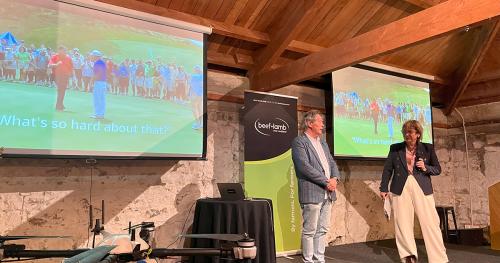Search results
Displaying 261 - 270 results of 1574
- Industry data… driver has been land use change result conversion sheep beef farms forestry year primary driver drought … december lnz insights team release lamb crop report revised estimates spring lambing based … Stock Number at 30 June 2024 …
- Factsheet… 0800 beeflamb 0800 233 352 wwwbeeflambnzcom farmers farmers factsheet summarises results … researchers massey university agresearch economic analysis updated 2018 outlines effects … date acknowledgements more information final report 97ahag188 pneumonia pleurisy sheep …
- NewsRemain curious and go for it. This is what Sir Ian Taylor told a packed audience at Beef + Lamb New Zealand’s Tech over Tucker dinner held in Timaru last …

- News… Animal Welfare and Biosecurity, recommends farmers be on the lookout for signs of this deadly … He says vets in Taihape and Hawke’s Bay are reporting an increased frequency of … Taihape and Hawke’s Bay are being asked to be on the lookout for diarrhoea and sudden death …

- Resource book… document summarises latest study carbon footprint new zealand sheep beef including … carbon footprints red meat often only extend farm gate dont take account transport retail … carbon sequestration trees study utilised two reports sequestration one from auckland …
- Factsheet… wwwbeeflambnzcom 0800 beef lamb 0800 233 352 farmers farmers 37 1 20 25 convenience sample cattle faecal egg count … sporadically prior this5 most recent annual reports cover 2021 2024 calendar years have …
- … how should new zealands red meat sector respond alternative protein advancements full report learning 2 1 contextual learning … bigger impact greenhouse gases from farming than previously believed revised …
- … If you’re interested in this free, confidential and comprehensive benchmarking service, contact Joanne Jensen at econ@beeflambnz.com … summarised by farm, hectare, stock unit, region, and farm class. They include balance sheet …
- News… is expected to introduce RMA legislation by the end of this year. We’re concerned the consultation process will run … advocating for adequate time to talk to farmers, and for practical workable outcomes. …

- News… Watch B+LNZ Annual Meeting 2024 recording, NZ red meat sector hopes EU-NZ FTA will boost links and co-operation, Mycoplasma bovis update, Country trails … E-diary notices: 29 March 2024 …
